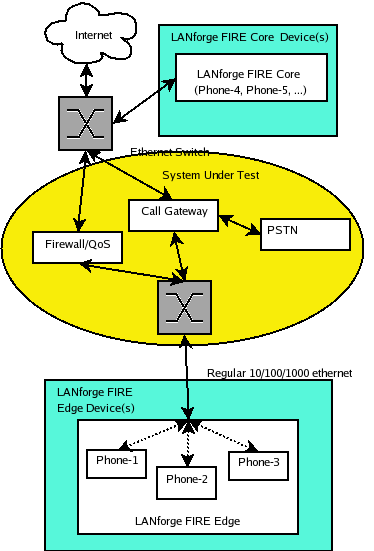 Excellent for testing whether or not an existing infrastructure can handle VoIP call loads or increased VoIP call loads. The LANforge FIRE VoIP Call Generator can also be used to test SIP gateways and other infrastructure. When using the MAC-VLAN feature in the Candela Linux kernel a virtual interface can be created for each phone, so each phone can use a unique IP address and use standard SIP protocol ports. Normal LANforge FIRE traffic generation features (Ethernet, UDP, TCP, HTTP, etc) is also provided at no additional charge.
Excellent for testing whether or not an existing infrastructure can handle VoIP call loads or increased VoIP call loads. The LANforge FIRE VoIP Call Generator can also be used to test SIP gateways and other infrastructure. When using the MAC-VLAN feature in the Candela Linux kernel a virtual interface can be created for each phone, so each phone can use a unique IP address and use standard SIP protocol ports. Normal LANforge FIRE traffic generation features (Ethernet, UDP, TCP, HTTP, etc) is also provided at no additional charge.
LANforge FIRE VoIP Call Generator supports MAC-VLAN virtual interfaces when used with the Candela Linux kernel. To the system under test, it appears as if there are multiple devices sitting inside a single LANforge system generating independent traffic streams.
Lanforge can also send traffic from one physical interface on the local machine to another interface on the same machine. Each physical and virtual interface can be configured for the same, or different subnets.
In the configuration below, the LANforge Fire Core can be one physical interface and act as the server. The LANforge FIRE Edge can be a second physical interface with multiple virtual interfaces configured. Both interfaces can be on the same machine.
It is also valid to use multiple LANforge machines on the edge and core for increased traffic generation capacity or to resolve constraints imposed by the layout of the network.

LANforge VoIP/RTP Call Generator Feature Highlights
- SIP protocol used for call management.
- SIP/UDP and SIP/TCP supported
- Can use directed mode, where VoIP phones call directly to themselves.
- Can also use Gateway mode where the VoIP phones register with a SIP proxy.
- RTP protocol used for streaming media transport, and supports the following CODECS. More codecs will be supported in the future.
- G.711u: 64kbps data stream, 50 packets per second.
- Speex: 16kbps data stream, 50 packets per second, www.speex.org
- G.726-16: 16kbps data stream, 50 packets per second.
- G.726-24: 24kbps data stream, 50 packets per second.
- G.726-32: 32kbps data stream, 50 packets per second.
- G.726-40: 40kbps data stream, 50 packets per second.
- G.729a: 8kbps data stream, 50 packets per second.
- NONE: A SIP-messaging-only configuration is now supported.
- RTCP protocol used for streaming media statistics.
- Each LANforge VoIP/RTP endpoint can play from a wav file and record to a separate wav file. Almost any sound file can be converted to the correct wav file format with tools bundled with LANforge. Sample voice files are included.
- Current benchmarks show support for up to 70 emulated VoIP phones per machine.
- LANforge VoIP/RTP endpoints can call other LANforge endpoints or third party SIP phones like Cisco and Grandstream. Third party phones can also call LANforge endpoints and hear the WAV file being played.

